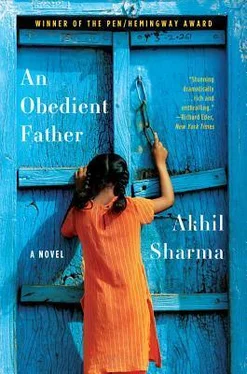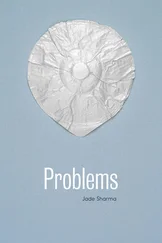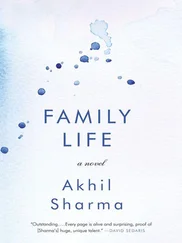"Ten-thirty." Without another word, he closed the door.
When I stepped back onto the road, the roofs were still crowded, but a jeep with six or seven khaki-uniformed policemen standing in it was slowly rolling down the road. The hoodlums had disappeared. My scalp crept from all the people gazing down. I wanted to break into a trot, but I made myself keep walking.
As I entered our compound, I smiled with relief and pride. When the world shifts it shifts everything with it, I thought. If I was
forthright and admitted my crimes instead of doing something like claiming that Anita's memories were confused, then over the next year or two we might learn to live with what had been acknowledged.
The door to the flat was closed but unchained. Rajesh was reading the newspaper while sitting on Anita and Asha's bed. His shirt was spread beside him on the bed and he was in his undershirt and pajamas. Asha sat on the floor reading a comic book. Seeing her and Rajesh sitting together and wondering if Anita might have told made me so afraid that my confidence instantly vanished.
Rajesh said, "I left Faridabad at three this morning." He toppled onto his side to show his exhaustion and repeated, "Three." He smiled. "Somebody phoned a neighbor, who warned everyone. When I heard, I thought. Better start now, in case there are riots." Across the aisle from the bed were two wooden chairs against a wall. I took off my shirt and draped it over one of these chairs. I sat down on the chair and began unlacing my shoes. Rajesh couldn't possibly be speaking this way if Anita had revealed my secret.
"Water?" Asha inquired.
I nodded and asked, "Where's your mother?"
"Bathing." Asha left.
"No riots. Nobody cares," Rajesh said. He rolled onto his back and stretched. All his limbs were thin, but his stomach was large. He closed his eyes and appeared to fall asleep. Rajesh joined the BJP after Radha died. Before that he had been quiet and somewhat sullen. Hindu nationalism had given him a salesman's buoyancy. This combined strangely with his dislike for me and made his insults strike with greater force. When Asha returned, Rajesh asked, without opening his eyes, "Did you just go to the pundit?"
"Yes," I answered.
"Have you been sleeping for a year that you just went?" Rajesh turned to Asha. "Has he been awake the last six months?"
"I went to Beri yesterday. Before, I was busy with work."
"Busy!" he said doubtfully, and then, after a moment, "You might as well stop raising money for Congress. Without a Nehru, Congress is just another party The BJP will win for certain."
Anita came into the bedroom with three cups of tea on a tray. Her hair was wet and had left a stain on the back of her white blouse. Looking at her, I understood that I had to admit everything, but I could not imagine the act of doing so. Till then, knowing what I must do had been enough to make me feel as if I would accomplish it, as if, in the knowledge that the moon reflects the sun, I had attempted to warm myself by the moon.
"Muslims will finally be treated like everyone else. In no non-Muslim country other than India can a Muslim marry more than one woman. . You want to divorce, then you pay alimony, like everyone else. . Their quota of Parliament seats is more than they should have."
He often spoke about polygamy "How many wives can you support that you are jealous?" I said without thinking. Because he had a bad job, Rajesh was worried about ever getting a wife. Jabbing him back instead of ignoring him made me realize I was speaking out of my fear of Anita.
As we took our teacups, Rajesh started talking about Pakistan, but I had trouble concentrating and his words ran past me. Both Anita and Asha sat on the bed with Rajesh.
There was a distant explosion and we all jerked in place. Then, after a brief silence, there were two more. Asha began to cry.
Rajesh pulled Asha into his arms. "That was a really fat man farting," he said. Asha laughed. Rajesh made farting noises with his lips and Asha laughed some more. "Fatter even than your grandfather." Rajesh held Asha at arm's length and shook her. "Silly doll," he said. Once Asha was calm, he asked Anita for mathri and mango pickle.
Rajesh rubbed the mango pickle over the wafers, until the oil soaked through the fried dough; then he ate each mathri in a single bite.
Rajesh had an ulcer and was constantly getting sick because he
loved the spicy food sold on the streets. I wanted to call for a peace and said, "You should be more careful."
"I can't help eating. I'm your son," he answered with his mouth full. I glanced at Anita to see how Rajesh's insult was received. She drank her tea without any expression.
"I'll take a bath," I said, and stood.
"See how they bribe us," Rajesh exclaimed. "On holidays and days they're afraid of riots, the municipality will let you have water all day. The rest of the year…"
"I'd rather be bribed than not get water," I interrupted.
With each mug I poured over my head, I tried to revive my courage. I had done a brave thing with the Sikhs and so should be able to be brave at home. I scrubbed myself Denial would only make her angry. The bathroom lightbulb was weak. The small room was dark from shadows and mold growing on the walls. To say words which admitted what I had done was like speaking a spell that brought a monster into the world. To admit my crime was to end the world. No possibilities could be imagined after the admission.
Because of the food Anita had begun heating, the common room smelled like a holy day. I heard Rajesh and some man talking eagerly in the living room. It took a moment for me to realize that the other voice was Mr. Mishra's. I had invited him at some point last week and forgotten. I hung my washed underclothing on the balcony ledge, put on pants and shirt, and went into the living room.
Mr. Mishra was on the sofa and Rajesh was on a love seat across from him. Mr. Mishra stood and shook my hand. "I thought I'd come and offer my support," he said. "This is a bad day for many reasons."
I thanked him. His remembering to come seemed proof that there was more to me than my crime against Anita. Just that morning I had saved lives. I sat down on the large bed pressed against the wall between Anita's bedroom and the living room.
The conversation did not resume. Mr. Mishra's presence reminded me I was to be in mourning, and perhaps I reminded Mr. Mishra and Rajesh of the day's seriousness. Rajesh had put on his shirt. I was glad at this politeness, because he could be unpre-
dictably rude. Anita came with tea for us and we drank it in silence. When I was nearly done with mine, I asked Mr. Mishra if he thought Rajiv Gandhi's murder would incite much of a pity vote for Congress.
"We were talking about that," Rajesh said.
"Probably not," Mr. Mishra answered, taking charge of summarizing the recent discussion. "He wasn't loved like his mother. His mother was smart. She wanted people to think she was India."
"The Nehrus may not be gone yet," Rajesh said. "They are like Ravan's heads. You cut off one and another takes its place. Nehru, i Indira, Sanjay, now Rajiv. Each time we thought, At last the family is dead."
I could have chosen not to pursue the conversation, but talking about politics kept me feeling the world had altered. "I didn't think that," I said.
"Because Congress pays you."
"There's Rajiv's wife. But Sonia Gandhi is Italian," Mr. Mishra added, ignoring the discord between Rajesh and me by not looking at either one of us. "Nothing like this has happened before." I liked hearing of the day's uniqueness.
"Indians are children and they think the Nehrus are their parents. Children must grow up," Rajesh said.
"Who is going to replace Congress?" I said. "The BJP? The BJP thinks Indians are children. 'God and Bread,' 'God and Bread.' What sort of platform is that? What does God have to do with the balance of payments? When the BJP says God, it means India for Hindus."
Читать дальше












